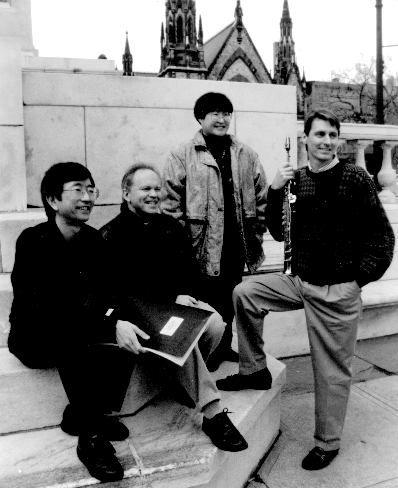|
|
Peabody Symphony Orchestra Makes New York DebutMusic: 110 players to take the stage at Lincoln Center's Alice Tully Hall
Anne Garside |

In its 101-year history, the Peabody Symphony Orchestra has played such prestigious venues as Tchaikovsky Hall in Moscow and the Kennedy Center in Washington, D.C. But, surprisingly, it has never played New York. Until now.
When Bob Sirota became director of the Peabody in 1996, he decided that would be one of his goals. "Playing in major halls is an essential educational experience for our students," he affirms.
Under the baton of its music director, Hajime Teri Murai, the orchestra will appear in Alice Tully Hall at Lincoln Center on Saturday, May 2. The concert was previewed yesterday at the Gordon Center in Owings Mills, and another performance is scheduled for Tuesday, April 28, in Friedberg Hall at Peabody.

En route to the Peabody Symphony Orchestra's Lincoln Center concert are, from the left, Hajime Teri Murai, music director; composer Michael Torke; composer Chen Yi; and saxophone soloist Gary Louie. Baltimore audiences can hear a preview concert on Tuesday. |
Hajime Teri Murai has served as the music director of the Peabody Symphony Orchestra since 1991, when he was appointed to the Ruth Blaustein Rosenberg Music Director's Chair. Since that time he is credited with honing the orchestra into one of the finest conservatory orchestras anywhere in the world.
Murai chose the Alice Tully Hall program with great care. He wanted to demonstrate the virtuosity and versatility of his approximately 110 young players, whose ages mostly range from 18 to 25.
Says Murai, "There is a great motivating factor in playing New York. Tours are always good because they help focus the students to play their best."
The program will begin with the world premiere of Momentum, a commissioned work by Guggenheim Award-winning composer Chen Yi, a native of the People's Republic of China. Chen, a member of the Peabody faculty, draws on the traditional music of her own country to create a work that expresses the flowing and intricate lines of Chinese calligraphy.
Chen is currently such a "rising star," in the words of The New York Times, that her commissions stretch well into the next century. She has not looked back, she says, since the day when Madame Mao pulled her out of a Chinese labor camp at the age of 17 to become concertmistress of the revived Peking Opera Troupe after the Cultural Revolution. She has been on the Peabody faculty since 1996.
The orchestra will also be giving another premiere: the first performance in Baltimore and New York City of Michael Torke's Saxophone Concerto (1993), performed by classical saxophonist Gary Louie of the Peabody faculty, who is regarded as the country's leading proponent of the saxophone as a classical instrument.
With two of his most widely performed works, Ecstatic Orange and The Yellow Pages (both written in 1985 while he was a composition student at Yale), Torke has practically defined post-minimalism, a music that utilizes the repetitive structures of a previous generation to meld musical techniques from both the classical tradition and the contemporary pop world.
Twelve days before the New York concert, at a rehearsal at Peabody, the intensity is palpable. Soloist and orchestra members are still in the early stages of mastering the intricacies of Torke's concerto. Louie is leaning into his saxophone, his long legs in a crouch position. Instead of facing out to rows of empty seats, which are sprinkled with coats, backpacks and instrument cases, he is facing the orchestra. Hearing Louie even in rehearsal, one can understand why The Washington Post once proclaimed that Louie's saxophone "soared into realms where it seemed to embody, not merely represent, the dramatic subjects."
The program concludes with Prokofiev's Fifth Symphony, which Hajime Teri Murai considers one of the great works of the 20th century. Prokofiev wrote the piece in the summer of 1944, when the Soviet armies were going on the offensive in a final victorious sweep to end the war the Russians call "The Great Fatherland War." Although written in the middle of the 20th century, the Prokofiev follows in the tradition of the great 19th-century romantic symphonies.
To give as many students as possible the experience of leading an orchestra, the position of concertmaster always rotates. For the New York concert, there will be two in the role: Alexander Zhuk, a native of Moscow, for the Saxophone Concerto, and Sheng-Tsung Wang, a native of Taiwan, for the Chen Yi and Prokofiev works.
"It's fantastic to be a part of such premieres," says Sheng-Tsung after rehearsal. "We are nervous, but it's a good kind of nervousness. We want to give our best. There's an inner kind of excitement, and we're going to try and show it through the music."
The Alice Tully Hall concert is the centerpiece of a New York convocation of Johns Hopkins trustees and alumni. The orchestra will travel to New York early Saturday morning and rehearse in the afternoon; when Teri Murai brings down his baton in Alice Tully Hall at 8 p.m., the orchestra will respond con brio.
|
Hajime Teri Murai, music director
Chen Yi: Momentum (1998), world premiere
Tuesday, April 28, 8 p.m.
Saturday, May 2, 8 p.m. Tickets available through the Alice Tully Hall box office, 212-875-5000, or Center Charge, 212-721-6500.
|
| GO TO APRIL 27, 1998 TABLE OF CONTENTS. |
| GO TO THE GAZETTE HOMEPAGE. |